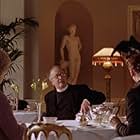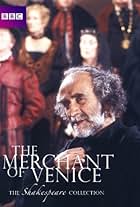VALUTAZIONE IMDb
7,2/10
309
LA TUA VALUTAZIONE
Aggiungi una trama nella tua linguaShylock, a Jewish moneylender, demands his due of a pound of flesh for a forfeited loan.Shylock, a Jewish moneylender, demands his due of a pound of flesh for a forfeited loan.Shylock, a Jewish moneylender, demands his due of a pound of flesh for a forfeited loan.
- Candidato a 1 Primetime Emmy
- 1 candidatura in totale
Peter Anthony Rocca
- Stephano
- (as Peter Rocca)
Trama
Lo sapevi?
- BlooperIn the last scene, Portia says: "It is almost morning." Yet, it is clearly already day.
- Curiosità sui creditiA Kaddish is sung over the end credits, supposedly indicating that Shylock has died.
- ConnessioniFeatured in The 26th Annual Primetime Emmy Awards (1974)
- Colonne sonoreKaddish
Performed by Heinz Danziger
Recensione in evidenza
If The Merchant of Venice were a tragedy and Shylock its protagonist, this would be a perfect production. Since it is a comedy, and Shylock is the villain, there are problems.
This British National Theatre version cuts Shylock's asides, Jessica's scene in male attire, Old Gobbo, and much of Lancelot Gobbo.
Set in Edwardian England, it adds voice-overs (an off-screen scream after Shylock leaves the court and a Jewish requiem - the "Kaddish" - at the end of the play) and photographs of his beloved wife and daughter to make Shylock seem more sympathetic. As part of this process, Jessica and Lorenzo become unsympathetic characters who do not appear to be in love with each other. The romantic, "in-such-a-night" scene (5.1) is played with the two standing as far apart as possible, with the cold, presumably fortune-hunting Lorenzo smoking a pipe. The production ends with a guilt-stricken Jessica alone.
The cast, though a bit old for the parts, is uniformly and undeniably charming, and Olivier ranges from excellent to superb.
This reinterpretation of the play is by no means unusual or unjustifiable in a post-Holocaust world, and it makes an effective film.
This British National Theatre version cuts Shylock's asides, Jessica's scene in male attire, Old Gobbo, and much of Lancelot Gobbo.
Set in Edwardian England, it adds voice-overs (an off-screen scream after Shylock leaves the court and a Jewish requiem - the "Kaddish" - at the end of the play) and photographs of his beloved wife and daughter to make Shylock seem more sympathetic. As part of this process, Jessica and Lorenzo become unsympathetic characters who do not appear to be in love with each other. The romantic, "in-such-a-night" scene (5.1) is played with the two standing as far apart as possible, with the cold, presumably fortune-hunting Lorenzo smoking a pipe. The production ends with a guilt-stricken Jessica alone.
The cast, though a bit old for the parts, is uniformly and undeniably charming, and Olivier ranges from excellent to superb.
This reinterpretation of the play is by no means unusual or unjustifiable in a post-Holocaust world, and it makes an effective film.
I più visti
Accedi per valutare e creare un elenco di titoli salvati per ottenere consigli personalizzati
Dettagli
- Data di uscita
- Paese di origine
- Sito ufficiale
- Lingua
- Celebre anche come
- The Merchant of Venice
- Aziende produttrici
- Vedi altri crediti dell’azienda su IMDbPro
Contribuisci a questa pagina
Suggerisci una modifica o aggiungi i contenuti mancanti

Divario superiore
What is the Spanish language plot outline for Il mercante di Venezia (1973)?
Rispondi
























